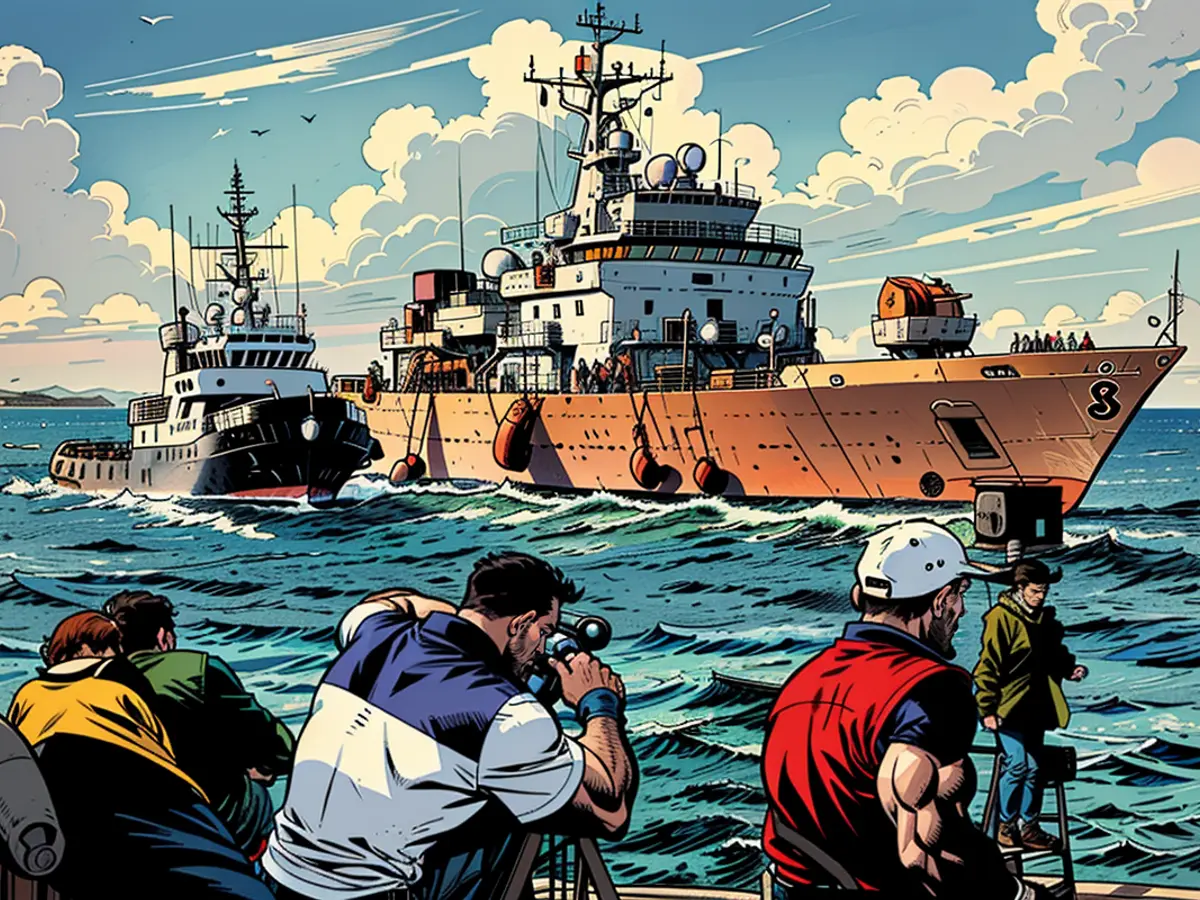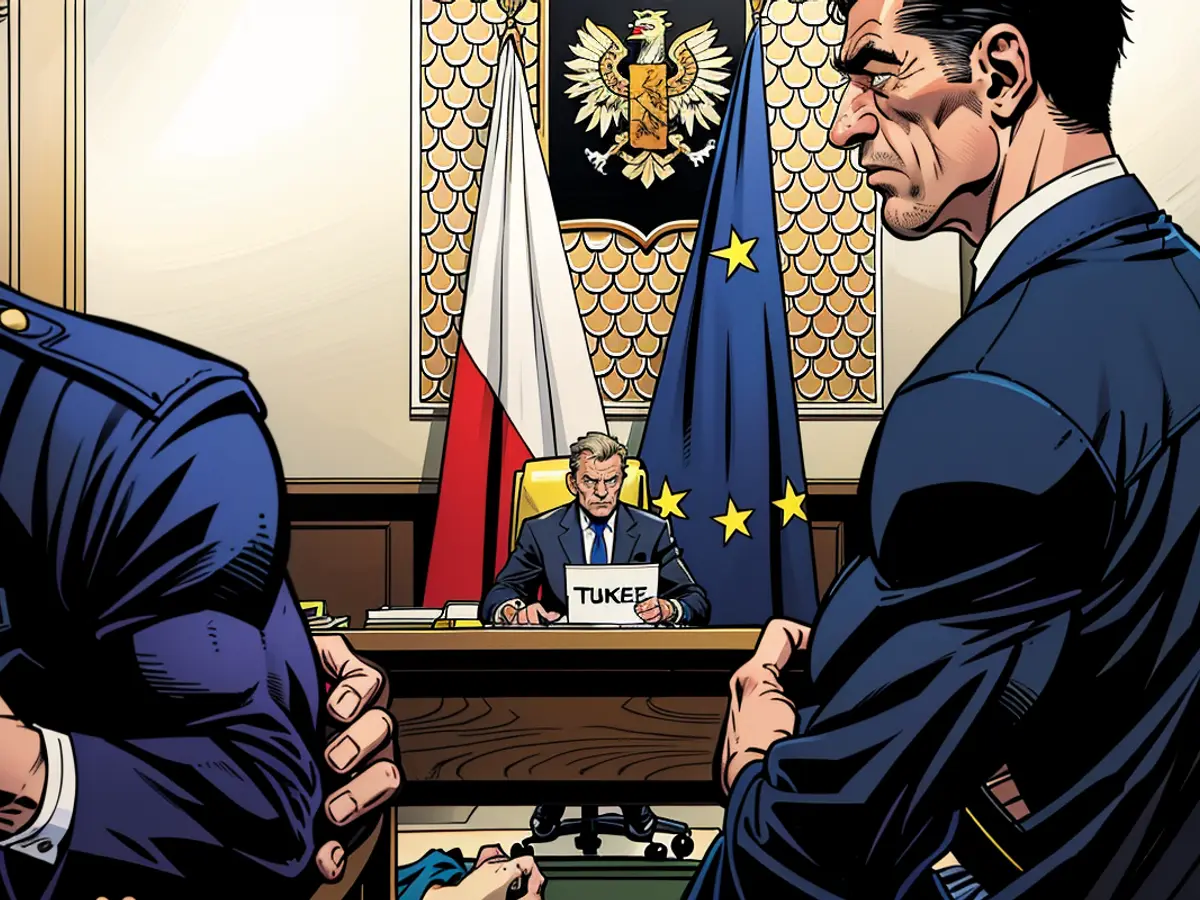Europe's political center-leaners are shifting towards conservative stances on immigration. For certain individuals, this shift could potentially happen too late.
Former EU Council president Donald Tusk, known for his ties to Brussels and seen as both a savior and a scapegoat in Poland's divisive political landscape, announced on Saturday his intention to momentarily halt the right to seek asylum in Poland. If necessary, he stated he'd challenge the EU on this matter.
Tusk shared this stance on social media, utilizing language reminiscent of the authoritarian populist movement he defeated not too long ago. This statement, released to maximum impact on the anniversary of his victory, was in response to a persistent conflict at the Polish border with Belarus, a situation alleged to be backed by Russia.
Europe's criticisms of Poland's approach surprised many, as it seemingly contrasted with one of the EU's fundamental principles. Yet, this might not have been unexpected, given that Europe's moderate leaders appear to be abandoning their previous stance on migration issues, favoring positions previously held by the continent's right-wing populists.
In fact, Germany implemented border checks at all of its frontiers last month, and France hinted at impending immigration restrictions. Both countries have been unsettled by recent events, such as high-profile murders linked to migrants and rising popularity of far-right parties.
Across Europe, countries are examining Italy's new agreement to transfer migrants to Albania, which commenced this week.
During a summit in Brussels, European leaders expressed a diverse set of concerns regarding a precarious EU migration deal. However, those advocating for a more inclusive approach, such as Spain's Pedro Sanchez, appeared outnumbered.
"Most politicians in Europe know that they cannot triumph on migration unless they propose something similar to Tusk's proposal," stated Jacek Kucharczyk, president of Warsaw-based think tank Institute of Public Affairs.
Tusk has the influence to advance this agenda in Europe and is conscious that the illegal migration issue could be detrimental to a centrist government if it surrenders ground to the far-right. French President Emmanuel Macron narrowly avoided such an outcome this summer, and Germany's Chancellor Olaf Scholz is trailing behind the far-right AfD in opinion polls.
In Poland, as in much of Europe, "voters across the spectrum anticipate that border security and migration controls are the top priority," Kucharczyk explained. "There is minimal room for maneuver for any politician."
A Russia-instigated predicament
This week, Tusk was poetic about his decision to suspend asylum, telling Poles that he would "demand recognition" from Europe. Initially, the European Commission agreed to this; a spokesperson mentioned on Thursday that member states had an obligation to provide access to the asylum procedure, and Europe should address the Belarus border situation without compromising on its values.
However, later in the day, leaders pledged "solidarity" with Poland and outlined a course toward more rigid, union-wide measures, writing: "Extraordinary situations necessitate applicable measures."
The situation at the Belarus border is undoubtedly exceptional. Belarus has been accused of encouraging migrants to reach the Polish border, presumably to expose vulnerabilities in the EU's borderless principles and common asylum system, at Russia's behest.
Thursday's triumph for Tusk in Brussels highlights a broader shift towards intense skepticism towards irregular migration in Europe. The continent's vernacular now includes concepts such as external "return hubs" to which asylum seekers are transferred - an extreme notion just two years ago that now carries significant weight.
EU Commission President Ursula von der Leyen, German Chancellor Scholz, and British Prime Minister Keir Starmer - previously seen as potential counterweights to anti-migrant populism - have been competing to emphasize their consideration of Italy's agreement with Albania.
Its proponent, Italy's right-wing leader Giorgia Meloni, was expected to be ostracized on the European stage when she assumed power two years ago. Now, an increasing number of leaders are following in Meloni's footsteps.

European arrivals have actually decreased; there have been approximately 140,000 this year, a notable drop from last year's seven-year high of around 275,000.
However, instability and displacement in the Middle East, the success of populist parties throughout the continent, and violent incidents allegedly perpetrated by migrants, often aided by misinformation, have resulted in an escalating significance of the topic.
This has left migrant rights groups increasingly isolated. The International Rescue Committee characterized Britain's opening of offshore centers as a "dark day for the EU's asylum and migration policies," expressing hope that this protocol will not serve as a template for others. "Keeping people imprisoned behind barbed wire, deliberately hidden from view and out of mind, is not a viable solution to Europe's migration difficulties," IRC's EU advocacy director, Marta Welander, stated in a statement to CNN on Tuesday.
A recently discussed new EU migration accord, intended to distribute the responsibility of assessing asylum applications more equitably among EU nations, has been under scrutiny by the 27 EU leaders. Some advocates for its earlier implementation, while others, like Tusk, have expressed reservations about accepting relocated asylum seekers.
Persistent controversy surrounds Europe's current political climate, which is spearheaded by 27 influential leaders, each mindful of their local constituencies' sentiments. This continent-wide division is fueled by the intensifying discontent towards both legal and illicit immigration.
In Poland, Tusk is attempting to steer this controversy towards his advantage. A seasoned centrist politician, Tusk has built some political capital amidst his electoral victory one year ago. However, the populist Law and Justice (PiS) party, which he ousted last October, remains a formidable adversary, its criticisms against Tusk generally focusing on his alleged allegiance to Brussels and perceived weakness on border security.
Innuendos cloud Tusk's migration strategy. Although its focus has shifted towards the Belarus border crisis rather than initial discourse suggested, it is not immediate, and its journey to becoming law is uncertain. Finland has adopted a comparable strategy this year, while Tusk's stance on border security has long centered on deterring the masses amassing at the Belarus border.
Surprisingly, key details about Tusk's approach were omitted from his initial proclamation. According to Kucharczyk, Tusk deliberately emphasized his asylum policy stance to gain attention. The migration and border security narrative, which PiS has profited from in the past, has now been seized by Tusk and potentially employed against PiS itself.
If successful, Tusk hopes this move will advantage him in Poland's upcoming election to replace its PiS-aligned, veto-wielding president, an outcome critical for the coalition's legislative aspirations.
Meanwhile, Scholz may be observing wistfully. Tusk has lashed out on the border issue before it depletes his popularity, while Scholz, whose SPD party is predicted to lose power next year, has been slow to respond to public anger, recently exacerbated by a lethal stabbing incident in Solingen. The suspect, identified as a 26-year-old Syrian man with suspected ISIS ties and facing deportation, added fuel to the fire.
Following this event, the AfD gained the first far-right state election victory in the country since the Nazi era, a groundbreaking result that sent shockwaves across Europe. In response, Scholz introduced border checks in western Germany, in addition to existing checks in its eastern regions. Hungary and Slovakia have adopted similar measures.
In the end, the longevity of the Schengen Area's long-standing borderless policy hinges on how Europe's current centrist leaders adapt to rising migration and populist agitations.
The response to this dilemma, in part, relies on how skillfully Europe's current centrist leaders confront their populist counterparts while preserving a moderate image. On this front, Tusk appears eager to chart a path forward. Yet, from the left-wing perspective, there are potential hazards ahead.
"Tusk's electorate may appreciate the security element (of his asylum plan)," asserts Kucharczyk, "but they will also want to see how (he) differentiates himself from the hard-right."
CNN's Barbie Latza Nadeau contributed reporting.

Europe's leaders, including German Chancellor Scholz and British Prime Minister Starmer, are now emphasizing their support for Italy's agreement with Albania, a shift from their previous stance on migration issues. This indicates a growing skepticism towards irregular migration across Europe.
Tusk's announcement to halt the right to seek asylum in Poland has gained attention in the European context, potentially shifting the migration and border security narrative away from the populist Law and Justice (PiS) party.







